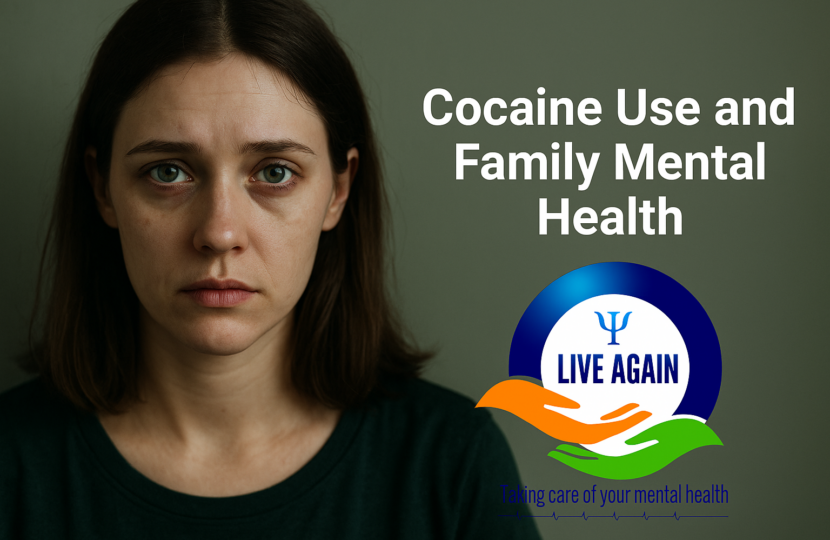The Hidden Storm Within Families
Cocaine use and family mental health are deeply intertwined. It is not merely an individual’s hidden battle – it is a force that reverberates through homes, relationships, and generational patterns of emotional distress. Cocaine use reshapes emotional availability, disrupts family roles, and dissolves the trust structures that relationships are built on. While its physiological dangers are widely publicized, the silent emotional toll it takes on family mental health remains a vastly under-addressed crisis.
At Live Again India (L@A), we’ve worked with hundreds of cases where cocaine addiction doesn’t just affect the individual — it destabilizes marriages, damages emotional safety, and fractures communication across generations. Lets understand cocaine use and family mental health.
Cocaine and the Body: What Happens Internally?
Cocaine acts as a powerful central nervous system stimulant. When someone uses cocaine, their body experiences:
- Rapid heart rate – Cocaine’s stimulant effect significantly accelerates heart rhythms, forcing the cardiovascular system into a state of hyperactivity. This rapid pacing increases the risk of arrhythmia, palpitations, and sudden cardiac events, especially in individuals with underlying health conditions or prolonged usage history.
- Constricted blood vessels – Cocaine causes significant narrowing of blood vessels (vasoconstriction), reducing oxygen and nutrient delivery to vital organs, including the heart and brain. This restriction can increase the risk of tissue damage, stroke, or long-term cardiovascular issues due to sustained oxygen deprivation.
- Elevated blood pressure – Cocaine stimulates the sympathetic nervous system, causing blood pressure to spike dangerously. Prolonged elevation places immense strain on the heart and arteries, increasing the risk of life-threatening conditions such as aneurysms, heart failure, or hemorrhagic stroke. Even a single high-dose event can be enough to trigger acute cardiovascular collapse in vulnerable individuals.
- Sleep disturbances – Cocaine disrupts the brain’s circadian rhythm and neurotransmitter balance, leading to acute insomnia, heightened restlessness, and altered sleep architecture. Users often experience fragmented or shallow sleep, vivid nightmares, or complete sleeplessness for extended periods. Over time, chronic sleep disruption contributes to emotional instability, weakened immunity, and increased risk of mood disorders such as depression and anxiety.
- Appetite suppression – Cocaine significantly reduces hunger by disrupting the brain’s hypothalamic signaling pathways that regulate appetite. As a result, users often skip meals, experience severe nutritional deficits, and lose considerable weight. This malnutrition can impair cognitive function, reduce energy levels, weaken immunity, and accelerate physical deterioration, especially during prolonged use cycles.
- Increased risk of stroke or heart attack – Cocaine places extraordinary stress on both the cardiovascular and cerebrovascular systems. It can cause sudden spikes in heart rate, blood pressure, and vascular constriction, leading to an increased likelihood of heart attacks, aneurysms, and strokes. These risks are especially pronounced in long-term users and individuals with pre-existing heart or circulatory conditions. Even short-term use has been associated with acute cardiac events, sometimes proving fatal without warning.
Over time, repeated use leads to cardiovascular damage, neurological strain, digestive disorders, and chronic exhaustion (NHS Cocaine Effects).
Emotional and Psychological Effects of Cocaine Use
Cocaine artificially spikes dopamine, the brain’s “reward chemical.” Over time, this alters how the brain processes emotions:
- Irritability – Cocaine alters the brain’s stress response system, making the user hypersensitive to stimuli. Even minor frustrations or social interactions can lead to exaggerated emotional reactions or sudden outbursts. Over time, this persistent state of irritability damages personal relationships, creates tension in daily environments, and contributes to emotional burnout in both the user and their loved ones.
- Anxiety – Cocaine overstimulates the brain’s limbic system and stress response networks, creating a persistent state of internal agitation. Users often experience a heightened sense of unease, nervousness, or impending doom, even in calm environments. This chronic anxiety disrupts concentration, sleep, and emotional regulation, often leading to withdrawal from social interactions and a deep sense of internal chaos.
- Mood swings – Cocaine disrupts the brain’s natural balance of neurotransmitters, particularly dopamine and serotonin, leading to sudden and unpredictable emotional changes. Users may shift from intense euphoria and grandiosity to irritability, sadness, or rage within minutes or hours. These rapid fluctuations can strain relationships, impair decision-making, and contribute to a chaotic inner emotional life that feels uncontrollable for both the user and those around them.
- Emotional numbing – Cocaine disrupts the brain’s emotional processing circuits, leading to a blunted or flattened affect. Users often report an inability to connect with their own feelings, such as joy, sadness, or love, and struggle to empathize with others. Over time, this emotional void can alienate them from partners, children, and even themselves, fostering feelings of isolation, disconnection, and existential emptiness.
- Paranoia or delusions – Cocaine can disrupt the brain’s perception of reality, particularly during binges or high doses, leading to heightened suspicion, fear of being watched or followed, and irrational thoughts that are not grounded in truth. These psychotic symptoms may escalate into full-blown delusions or hallucinations, causing severe distress for both the user and those around them, and can result in dangerous behaviors or self-harm if left unaddressed.
These symptoms can disconnect the user from loved ones, making mutual trust and emotional regulation difficult to maintain (American Psychological Association – APA).
Cocaine Use and Relationship Strain
Cocaine use and family mental health suffer the most at the relational level. The user may:
- Become emotionally unavailable – Cocaine use often leads to emotional withdrawal, where the user becomes disconnected from the emotional needs and experiences of those around them. This distancing may be subtle at first — less eye contact, reduced engagement in conversations, avoidance of intimacy — but gradually evolves into a complete lack of emotional presence. Even close family members, including children, may feel unseen, unheard, or neglected, creating long-term damage to attachment and trust.
- Develop hyper-sexual or porn-addicted behavior – Cocaine use often leads to compulsive sexual behavior or excessive consumption of pornography as a form of dopamine-seeking during or after intoxication. These behaviors can distort sexual expectations, reduce emotional presence during intimacy, and create a parallel addiction that competes with the real-life relationship. Partners may feel objectified, emotionally disconnected, or even betrayed, leading to further relational damage and trust erosion.
- Display secrecy or dishonesty – Cocaine users often engage in covert behaviors to hide the extent of their addiction. This includes lying about where they’ve been, concealing financial transactions related to drug purchases, and masking emotional struggles behind a facade of normalcy. Such dishonesty erodes trust, creates emotional distance, and forces loved ones to live in a constant state of suspicion and emotional instability.
- Become physically absent – Cocaine use often leads to erratic routines and prolonged absences from home or family life. The user may spend extended periods outside without explanation, frequently miss important family events, or become unreliable in their commitments. This physical disconnection creates a deep void in the family dynamic, leaving loved ones feeling abandoned, unsupported, and emotionally unsafe.
- Cause financial instability – Cocaine use often leads to reckless financial decisions, including compulsive spending on drugs, impulsive purchases during intoxication, and neglect of essential financial responsibilities. The added burden of therapy, legal proceedings, or job loss due to addiction-related behavior can rapidly deplete savings and drive families into financial crisis, further intensifying emotional stress at home.
Partners often express feeling “invisible,” “replaced by the drug,” or trapped in emotional chaos.
Family Mental Health: Silent Casualties
Cocaine use and family mental health: Family members often absorb the hidden trauma of cocaine use. The result can be:
- Chronic anxiety – Family members may live in a constant state of emotional alertness, anticipating the user’s next unpredictable outburst, disappearance, or emotional withdrawal. This heightened vigilance activates the body’s stress systems, leading to sleep disturbances, irritability, digestive issues, and an overall sense of psychological instability that makes everyday life feel tense and unsafe.
- Depression or helplessness – Family members may experience deep emotional exhaustion and a growing sense of futility, as their efforts to help the user seem ineffective or unacknowledged. This can manifest as persistent sadness, hopelessness, guilt, and a withdrawal from daily life. Over time, these feelings can evolve into clinical depression, particularly when support systems are weak or the addiction remains untreated.
- Shame and isolation – Family members often experience a deep sense of embarrassment or self-blame due to the stigma surrounding addiction. In an effort to protect the family’s image or avoid judgment, they may withdraw from social gatherings, keep secrets from friends or relatives, and carry emotional burdens in silence. This isolation can intensify feelings of loneliness and helplessness, further weakening their mental health and resilience.
- Codependent behavior – Family members may take on the emotional burden of the user, feeling responsible for their recovery and emotional state. This often includes excessive caretaking, justifying harmful behaviors, or sacrificing personal well-being in an attempt to stabilize the addict. Over time, this dynamic creates a toxic cycle where both parties remain emotionally enmeshed, preventing true healing or accountability.
This creates a toxic emotional environment for children, partners, and caregivers — resulting in generational emotional scars (Neuroscience News).
Seeking Help: Signs It’s Time
Cocaine use and family mental health: If you or a loved one is showing these patterns, intervention may be needed:
- Two or more episodes of unexplained hyperactivity or energy surges –: These may include bursts of intense talkativeness, excessive movement, sleeplessness, or risky behaviors that appear out of character. Such episodes often reflect cocaine’s stimulant effect on the central nervous system and indicate a deeper pattern of neurochemical dysregulation that disrupts both the user’s internal stability and their interactions with others.
- Repeated dishonesty around money, whereabouts, or screen use –: This often includes lying about expenses related to drug use, hiding cash withdrawals, fabricating reasons for absences from home, and concealing compulsive behaviors such as pornography consumption or online gambling. Over time, this pattern of deception breaks down trust within the family, creates emotional distance, and forces loved ones into a constant state of suspicion and insecurity.
- Chronic emotional detachment –: Over time, family members may emotionally shut down as a defense mechanism against repeated disappointment, emotional pain, or fear of being hurt again. This detachment is often misinterpreted as indifference, but it is in fact a form of emotional exhaustion. Loved ones may become numb, avoid vulnerable conversations, or disconnect from both the user and other support systems, leading to a collapse in relational warmth and emotional expression.
- Overdependence on digital stimulation –: As emotional connections deteriorate and stress builds within the family, both the user and family members may begin turning excessively to digital devices as a coping mechanism. This includes compulsive scrolling, binge-watching, excessive gaming, or overuse of social media to numb emotional pain or avoid real-life conflict. This digital retreat can further isolate individuals, weaken communication, and create a false sense of detachment from the crisis unfolding around them.
- Emotional distress expressed by family members –: Loved ones may begin to outwardly show signs of mental strain, including frequent crying, irritability, anxiety attacks, or sudden emotional withdrawal. These responses often stem from accumulated fear, sadness, and helplessness. When emotional breakdowns become more frequent or visible, it’s a clear indicator that the psychological burden of addiction is overwhelming the family unit and requires urgent therapeutic support.
These are urgent indicators that the family system is under psychological strain.
Treatment is Possible: Recovery is Real
Cocaine use and family mental health: At Live Again India, we use a multidimensional recovery protocol:
- Medically supported detox – This is the first and most crucial phase of recovery, aimed at safely managing withdrawal symptoms and stabilizing the body. Under professional medical supervision, the user is gradually weaned off cocaine while being monitored for potential complications such as heart irregularities, seizures, or intense psychological distress. Medically guided detox creates a safer and more controlled environment, laying the foundation for effective long-term OPD based intervention or rehabilitation treatment.
- Psychotherapy and CBT – These therapeutic approaches help individuals explore the psychological roots of their substance use, recognize distorted thinking patterns, and develop healthier emotional responses. Through structured interventions, Cognitive Behavioral Therapy (CBT) equips clients with tools to manage triggers, reduce cravings, and rebuild self-regulation skills. Psychotherapy, meanwhile, offers a deeper exploration of trauma, identity, and unconscious behavioral loops that often fuel addiction.
- Couple and family therapy – This modality focuses on repairing communication breakdowns, rebuilding emotional trust, and redefining healthy boundaries between individuals and their loved ones. It provides a safe space for partners and family members to express their emotions, understand the psychological effects of addiction, and co-create a structured plan for mutual support and healing. These sessions are essential for restoring relational safety and preventing relapse triggers rooted in unresolved interpersonal conflict.
- Sexual behavior restructuring – This involves identifying and interrupting compulsive sexual patterns, particularly those tied to hyper-sexual intimacy or pornography addiction, which often co-exist with stimulant use like cocaine. Therapeutic strategies may include impulse control techniques, shame resolution, intimacy training, and reconditioning of arousal pathways. The aim is to reestablish healthy sexual expression and emotional connection while minimizing behaviors that damage relationships and emotional well-being.
- Long-term relapse prevention – This focuses on building sustainable recovery strategies beyond detox and initial therapy. It includes identifying high-risk scenarios, reinforcing behavioral coping skills, scheduling consistent therapy follow-ups, and setting realistic personal goals that align with the individual’s values and lifestyle. The objective is to prevent regression into old patterns while promoting long-term psychological resilience, accountability, and purpose-driven living.
Recovery is not only about quitting cocaine — it is about restoring connection, identity, and emotional health.
How a Therapist Can Help You
A trained therapist helps uncover the roots of cocaine use, rebuild emotional awareness, and facilitate safe communication between partners and family. They offer containment, guidance, and non-judgmental support to anchor the recovery journey. Therapy is not just for crisis; it is for repair and renewal.
Welcome to Live Again India
At L@A, we believe healing is a shared process. Whether you’re the one using or the one hurting beside them, we walk with you — through detox, therapy, and relationship rebuilding. Our model is built on empathy, structure, and sustainable transformation. You are not alone.
Live Again India: Supporting Your Mental Wellness
You may feel exhausted, confused, or broken. That’s valid. But help is here. Live Again India supports you with skilled therapists, real containment, and specialized recovery protocols. Your life, your family, and your mind can begin again — one honest step at a time.



